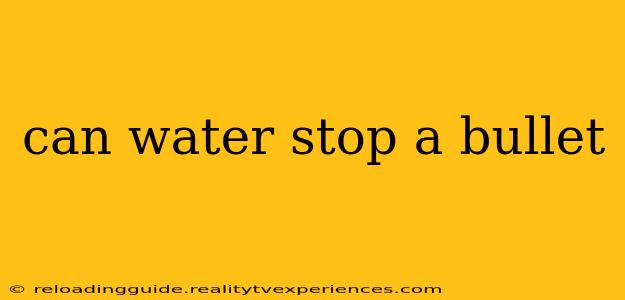The question of whether water can stop a bullet is a fascinating one, sparking curiosity and even inspiring scenes in action movies. The simple answer is: it depends. While water can significantly slow down a bullet, completely stopping it depends on several crucial factors. Let's delve into the physics behind this intriguing phenomenon.
The Science Behind Bullet Impact in Water
When a bullet enters water, it encounters immense resistance. This resistance stems from several factors:
-
Hydrodynamic Drag: Water molecules are much denser than air. This density creates significant drag as the bullet tries to push through the water, slowing its velocity dramatically. The faster the bullet, the greater the drag.
-
Cavitation: As the bullet travels, it creates a low-pressure area behind it, forming cavities or bubbles. These bubbles collapse violently, creating shockwaves that further impede the bullet's progress. This cavitation effect contributes significantly to energy dissipation.
-
Turbulence: The bullet's movement generates turbulence in the water, further increasing drag and disrupting the bullet's trajectory.
-
Bullet Type and Velocity: The bullet's caliber, shape, and initial velocity all play a significant role. A high-velocity, small-caliber bullet will penetrate further than a slower, larger-caliber round.
Factors Affecting Bullet Stopping Power of Water
Several factors determine whether a body of water can successfully stop a bullet:
-
Depth of Water: A deeper body of water offers more resistance, increasing the chances of stopping the bullet. A shallow puddle is unlikely to stop a bullet, whereas a deep lake or ocean has a much higher probability.
-
Type of Water: The temperature and density of the water can also affect stopping power. Colder, denser water will generally offer more resistance.
-
Bullet Composition and Construction: The material and design of the bullet significantly influence its ability to penetrate water. Hollow-point bullets, designed to expand upon impact, are more likely to be slowed and stopped by water compared to full metal jacket bullets.
The Myth vs. Reality: Water as a Bulletproof Shield
While water can significantly reduce a bullet's velocity and potentially stop it, it's crucial to avoid romanticizing its capabilities. It's not a reliable bulletproof shield. The stopping power depends heavily on all the factors mentioned above, and a bullet can still cause significant damage even after passing through a body of water. The shockwaves from cavitation can be quite powerful.
Furthermore, the penetration depth of a bullet in water is unpredictable. It's not a linear relationship – a bullet might travel a surprisingly long distance before losing enough velocity to be stopped.
Conclusion: A Complex Interaction
The interaction between a bullet and water is a complex physical process governed by hydrodynamic principles. While water offers significant resistance and can slow or even stop a bullet under certain conditions, it's not a foolproof method of protection. Relying on water as a shield against gunfire is extremely dangerous and should never be attempted. The best way to avoid bullet injuries is to avoid dangerous situations and to prioritize personal safety.

